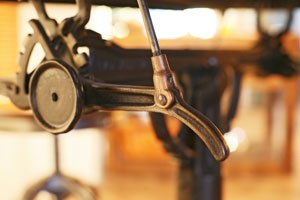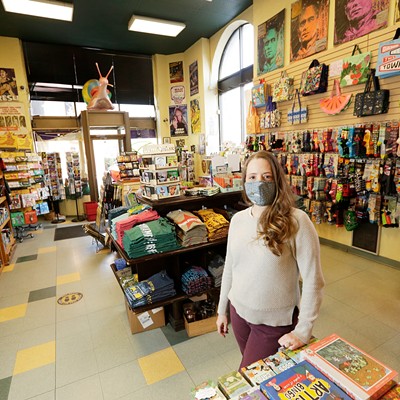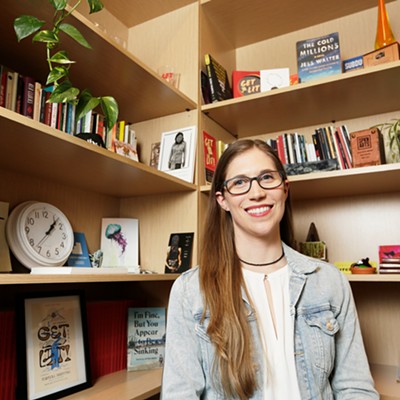Lana Neuman dreams in furniture. She has visions in which old tables and bowling alley lanes and industrial lathes disassemble themselves, trade parts, and come back together to form pieces that tell not one story but three or four — a little bit about the history of each piece, a little bit about the marriage of them all, and the most fleeting glimpse of the minds and hands that refashioned them.
At Pink, the downtown showroom where they exhibit their work, hundred-year-old dental lights become reading lamps on articulating arms. The base from a pommel horse and a lane from a bowling alley become a dinner table that seats 6-8.
In the dining room of the Spokane Valley home Neuman shares with her partner, Erica Parish, a massive wooden cog becomes a shelving system. Off the kitchen, a tabletop of cornersawn oak, its surface pitted with decades of wear, is mounted on the black iron legs from a table once used in veterinary embalming to become a bistro table that seats four.
The pair’s pieces are made from salvage that has lasted 100 years. It is refashioned to last 100 more. Their pieces cost from hundreds of dollars to several thousand and can weigh hundreds of pounds (so shipping can cost a thousand dollars as well).
And yet Neuman and Parish have more work than they know what to do with.
They built their name at Pacific Galleries in South Seattle — a location that put them in the path of buyers from Ralph Lauren and Nordstrom to the set designers of the Twilight films. The majority of their work goes to New York, L.A., and Chicago.
They believe that they have yet to build their best, most creative work, though. When they do, they will build it in a shop behind a white bungalow off Argonne in the Spokane Valley.
Lana Neuman grew up around antiques — her parents were dealers — but her dream was to be a firefighter. She used antiques to finance her trips around the region to take fire department tests, buying an antique in one town and selling it in another. Neuman got on with the City of Tacoma Fire Department but quickly blew her back out.
Erica Parish co-owned a gym near where Neuman did rehab.
Parish noticed Neuman coming and going. They began to talk. When Neuman was well enough, Parish offered her a job. They’ve been inseparable ever since. Neuman went from personal training to running clubs in Seattle alongside Parish. When they had an opportunity to sell, they took it.
More on
See more of Young Kwak's photos from this story, including some that we didn't include in print.
After that, Parish says she asked Neuman what she wanted to do with the rest of their lives. Neuman said antiques — she was thinking furniture from the 1800s, pristine condition, “really, really high-end stuff.” Parish was thinking something different.
Neuman is older than Parish by a decade, and she says Erica helped her understand what her generation of buyer was looking for: something that has been used, something whose imperfections tell a story. “Erica said people her age want something with crunch.”
And so, though it is Neuman who dreams in furniture, it was Parish who crafted the aesthetic. Parish considers Neuman the artist. Neuman considers Parish the muse.
Wanting
to be closer to family, they bought the house in Spokane Valley four
years ago and moved a year later. Their business address still says
Seattle (now in the trendy Georgetown neighborhood), but everything they
make comes from here. With the opening of Pink — their partnership with
Chaps’ Celeste Shaw and three other dealers — in July, they can sell
here now, too.
Neuman and Parish spent last Saturday grinding on a table for Starbucks. They bid for the job and Starbucks liked their design best but still required some tweaks to it. It’s slated for the coffee giant’s new South Lake Union store in Seattle. After a recent history of closing stores, Starbucks is opening them again. There are two more planned in western Washington, one in Seattle’s Ballard neighborhood and one in Bellevue.
“We’re hoping to get that work next,” Erica says.
In a perfect world, though, they wouldn’t be bidding for jobs at all. Neuman and Parish feel about their furniture and decor the way most artists feel about their art — it is best when it is the product of inspiration, which means when it is unique and for-the-occasion and completed without input from anyone’s eye but their own.
“The hardest thing is doing commissions,” Erica says. People who are paying thousands of dollars for a table tend to want to have their say in aspects of the design, which can place the women’s craft at odds with a buyer’s expectations. Sometimes the relationship fits as well as a quarter-sawn oak tabletop onto an embalming table base, but more often it doesn’t.
The two hope to one day grow the business to the point that commissions aren’t necessary. In their perfect scenario, Lana would have her visions while junking and her dreams after going to bed, and the women would spend their days working to make each a bespoke reality. They’d put them up for sale — whether at Pink or in Seattle or online at 1stdibs. com, where they sell their pieces alongside Cartier brooches and etchings by Richard Serra, to buyers all over the country — and people would just buy them.
They tell the story of a metal coffee table they built out of an old manure cultivator (whose prongs looked like hooves) topped with a thick piece of glass. It was simple, but there was a lyricism in the simplicity. They called it the Galloping Gertie table, for the way its lines undulated like the ill-fated Tacoma Narrows bridge.
It has become their best example for the way a forgotten piece of machinery can become a piece of functional art. As for the exact mental process of how it got there — from vision to dream to reality — Neuman tries to explain it but can’t.
She ends up shaking her head. “I don’t know,” she says, “My dreams are weird.” The good news is, they’re only getting weirder.
Deja Neu at Pink • 154 S Madison St. • Weds-Sat 10 am-4 pm • 838-2054

























